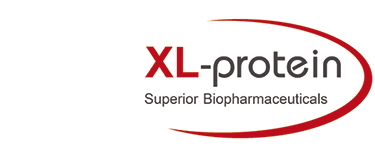XL-protein announces in vitro and in vivo data for its PASylated hGH
FREISING, GERMANY, September 23, 2011 – XL-protein GmbH, a German biotech company specialised in the development of biopharmaceuticals with extended plasma half-life, announced today preclinical in vitro and in vivo data for its xl020 PAS-hGH program. The xl020 data demonstrate XL-protein’s ability to furnish an approved biological drug with improved in vivo stability and plasma half-life using its proprietary PASylation® technology, leading to enhanced efficacy in an established animal model.
The results of XL-protein’s xl020 studies will be presented at the R&D of Novel Protein Therapeutics and Post-Translational Modifications Conferences on Tuesday and Wednesday 27/28 September 2011 in Berlin, Germany, in a presentation entitled “PASylation: a biological alternative to PEG for extending the plasma half-life of biopharmaceuticals”.
“This program is extremely exciting because it provides an in vivo proof of concept that a PASylated biological does not only show prolonged pharmacokinetics but also increased potency, even if applied at longer time intervals compared with the unmodified protein,” stated Uli Binder, co-founder and CTO of XL-protein GmbH.
XL-protein researchers documented that xl020 has much longer plasma-half life than the unmodified recombinant growth hormone while retaining high receptor binding activity, which translated into increased in vivo efficacy. In a preclinical mouse model of growth hormone deficieny, xl020 administration showed continuous strong weight gain over at least 10 days.
Arne Skerra, co-founder and CEO of XL-protein GmbH, said: “Our PASylated hGH program highlights XL-protein’s strategy of developing superior therapeutics based on approved biopharmaceuticals. xl020 is a promising development candidate that addresses a multi-billion dollar market world-wide.”
hGH is a natural peptide hormone that regulates body growth and metabolism. Growth hormone deficiency (GHD) can occur in both pediatric and adult patients (GHDA). Furthermore, hGH is currently approved for several other indications, for example AIDS wasting and cachexia or short stature caused by Turner’s Syndrome or Prader-Willi syndrome. xl020 should allow less frequent and lower dosing, promising better tolerability and patient compliance, also benefiting from the inherent biodegradability of PAS polypeptides.
XL-protein’s proprietary PASylation® technology can be applied both to existing biologics, yielding ‘biobetters’, or to innovative therapeutic proteins or peptides, leading to tunable prolonged plasma half-life by a factor 10-100 as demonstrated in numerous animal studies. Thus, PASylation® offers a superior solution to a general problem in biological drug development.
